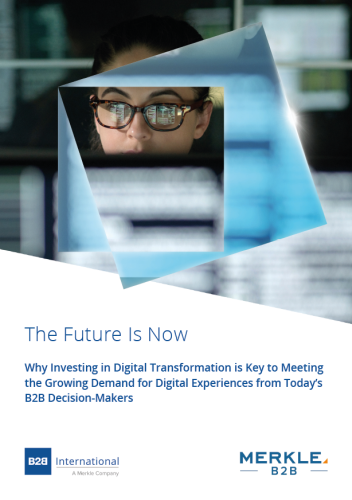The future is now
Investing in digital transformation is no longer optional for B2B businesses. It isn’t just a nice-to-have or something to put off as a strategy for the future.
The future is now.
2020 and its well documented challenges have accelerated change and B2B businesses have been forced to pivot to a digital-first world earlier than they would have liked or prepared for.
In fact, the world is changing so rapidly that in the first three months of 2020, McKinsey reported 10 years’ worth of eCommerce growth penetration by US companies1.
But change was already coming, long before the effects of the pandemic took hold.
A growing generation of millennial decision-makers have an insatiable appetite and demand for digital experiences. Their expectations when it comes to interacting with brands, shaped by their consumer experiences with B2C giants such as Amazon, are sky-high.
B2B brands take notice – digital is the difference between winning and losing in this new age of business. Digital is the key to delivering a customer experience that meets and exceeds the needs of today’s decision-makers.
CX performance is stagnating among B2B brands
Despite being a top priority for the majority of B2B businesses over the last few years, little progress has been made when it comes to delivering a better customer experience.
Back in 2015 when we started tracking the percentage of companies evaluating their performance as “strong” against the 6 pillars of customer experience, it’s clear that many of these companies were struggling to meet customer needs.
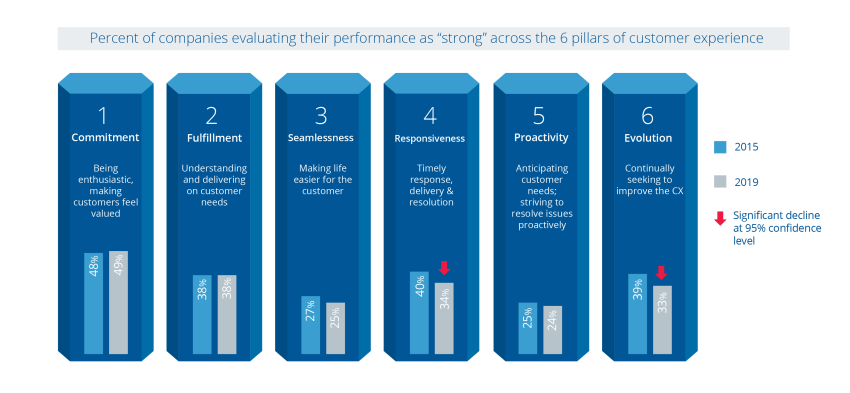
Fast-forward to December 2019 and the picture hadn’t changed. Performance had stagnated and even gone backwards in the case of “responsiveness” and “evolution”.
In fact, only 15% of B2B brands were considered ‘CX Leaders’ with strong performance against 5 or 6 of the pillars. The majority of brands were average performers with 56% delivering against 2 or 3 of the pillars, and a worrying 30% were considered ‘CX Laggards’ who don’t perform strongly on any of the pillars.
Why do B2B companies struggle to deliver a strong customer experience?
To answer this question, we looked at what makes the difference between a ‘CX Leader’ and the average or ‘Laggard’ performers.
Firstly, ‘CX Leaders’ excel on creating optimal value propositions, delivering innovation and communicating a strong and differentiated brand positioning.
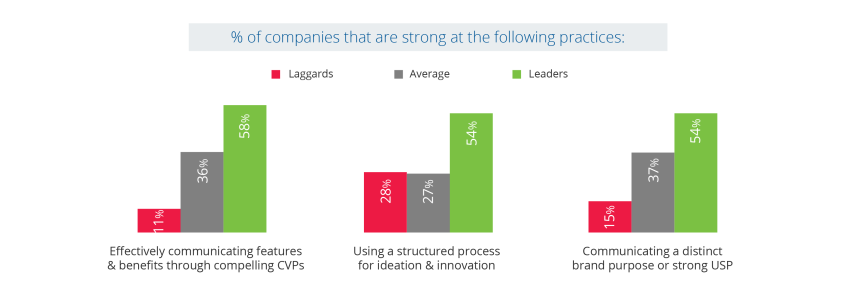
Leaders place the customer at the heart of every decision and are significantly more likely to invest in product development research and segmentation programs to closely align their proposition to different segments in the market.
Laggards on the other hand lack a foundational understanding of customer needs, attitudes and behaviors.
Before B2B brands can take advantage of the massive opportunity investing in digital brings to the customer experience, they must put this foundational understanding into place and instill a customer-centric mindset across the entire organization.
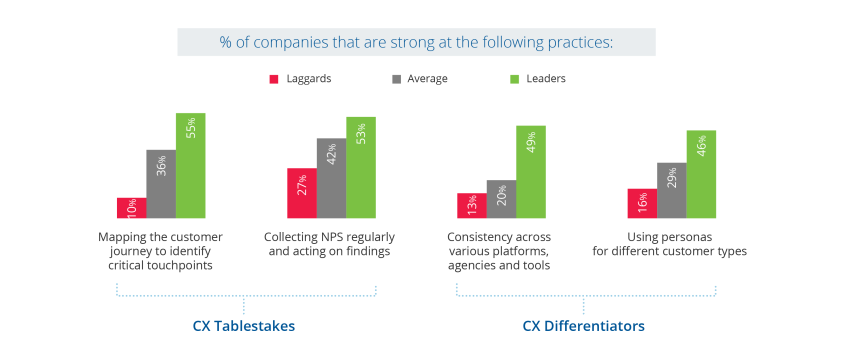
Secondly, ‘CX Leaders’ go deeper and look to deliver a seamless and consistent experience across every platform, channel, agency and tool. They are also adept at using personas to create highly relevant and personalized experiences that meet the emotional and functional needs of every different customer type, both online and offline.
Why digital is a big CX opportunity
What really separates ‘CX Leaders’ from the rest of the pack, and what lies at the heart of successful customer experiences in today’s world, is the use of digital.
Leaders understand that digital experiences are key to meeting the demands of the next generation of millennial decision-makers.
Not only will millennials make up 44% of the global workforce by 2025, our research shows that 73% of millennials in the workforce today are either making or influencing buying decisions for their company.
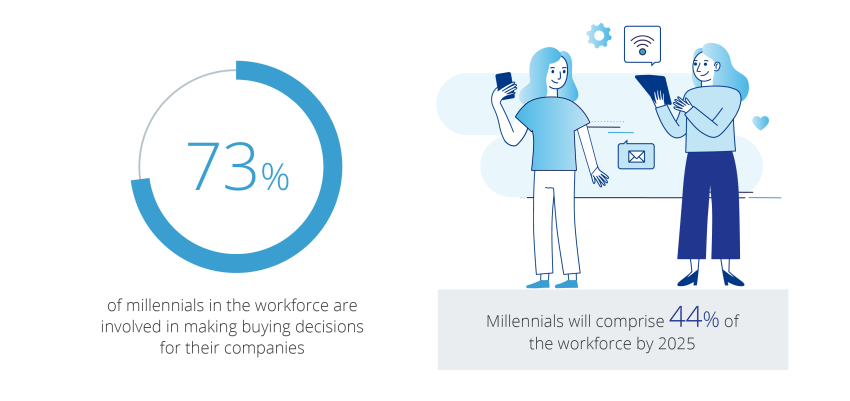
The urgency to invest in the digital experience is compounded further when you consider that B2B decision-makers are on average 57% of the way through the purchase journey before their first serious engagement with sales.
A strong digital experience, supported by online marketing initiatives and content, plays a crucial role in influencing buyers during these early stages of independent research and due diligence.
How the needs of millennial decision-makers differ from other generations
It will be of no surprise to learn that millennials rely much more heavily on online sources to learn and become aware of brands compared to older generations.
Our research shows that 16% of millennial decision-makers use online sources throughout the purchase journey, compared to just 7% of boomers.
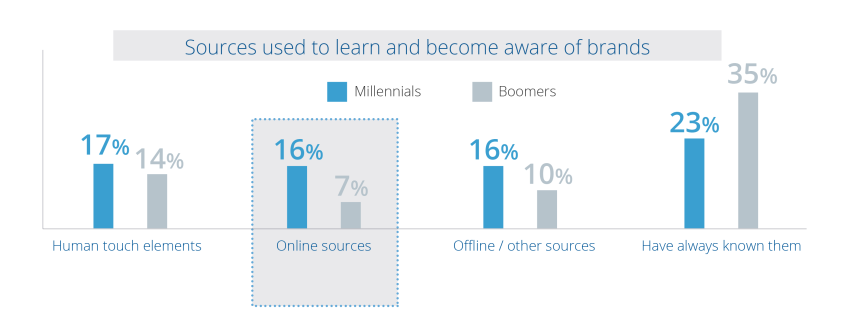
But a purely digital experience shouldn’t be the priority. An important balance needs to be struck between the speed and convenience of buying digitally and the need for a human touch that only direct interactions with other people can provide.
Not every customer wants the same thing and creating experiences that meet the needs of different segments in the market should be the focus.
Getting this balance right between digital and human experiences applies equally to millennial decision-makers.
In fact, millennials rely more heavily on the omnichannel experience with a greater use of both human touch elements and offline sources during the purchase journey compared to boomers.
So, meeting the needs of this new wave of decision-makers in the workforce not only requires investment into the digital channels themselves, but also relies on the supporting offline channels and back office processes to ensure a seamless experience online and offline.
Millennials have high expectations so B2B brands will have to act fast
Understandably, millennials also have far greater expectations when it comes to the digital experience and the value it should provide.
For example, 51% of millennials agreed that digital purchasing channels should deliver a more personalized solution, compared to 33% of boomers.
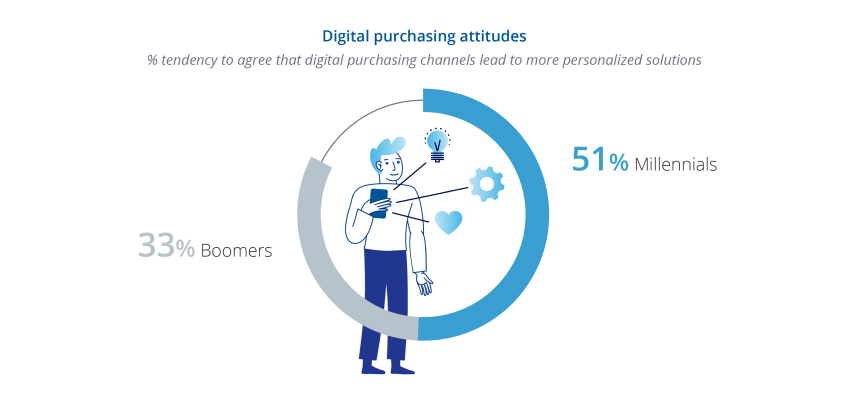
As we discussed earlier, delivering a seamless omnichannel experience and the effective use of personas to create personalized experiences is where ‘CX Leaders’ excel over average and under-performing brands.
They not only understand the needs of today’s decision-makers, but they are also able to design experiences that meet these needs and delight customers along the whole journey.
Investing in digital transformation and customer-centric digital experiences is a massive opportunity for B2B brands to win, but the longer they wait to implement changes, the further behind they’ll fall.
As more and more businesses wake up to the opportunity, it won’t be long before personalized omnichannel experiences become mere table-stakes and those ‘CX Leaders’ will have moved on to the next big opportunity.
Where B2B brands are focusing their digital investments
With this in mind, it’s encouraging to see that 2/3 of B2B businesses are looking to invest in digital-centric business models and change the way they service customers and communities in the future.
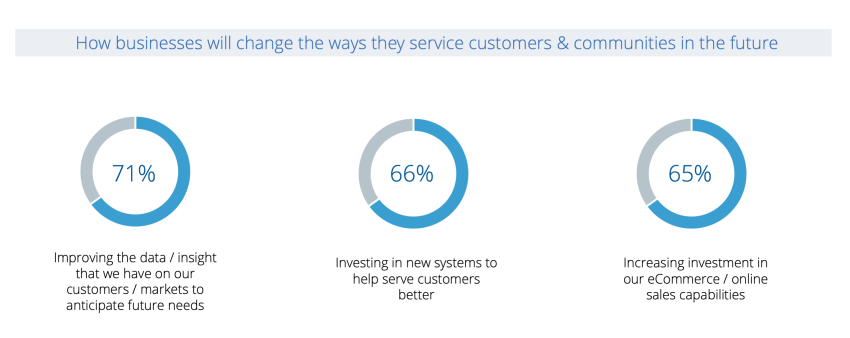
71% of businesses are looking to improve the data and insights they have on their customers and markets to anticipate future needs more effectively.
66% of businesses are looking to invest in new systems to better serve customers, and 65% are looking to invest in their eCommerce and online sales capabilities.
Digital investments are also expected to rise up the agenda internally as more and more millennials take up key decision-making roles inside their own companies.
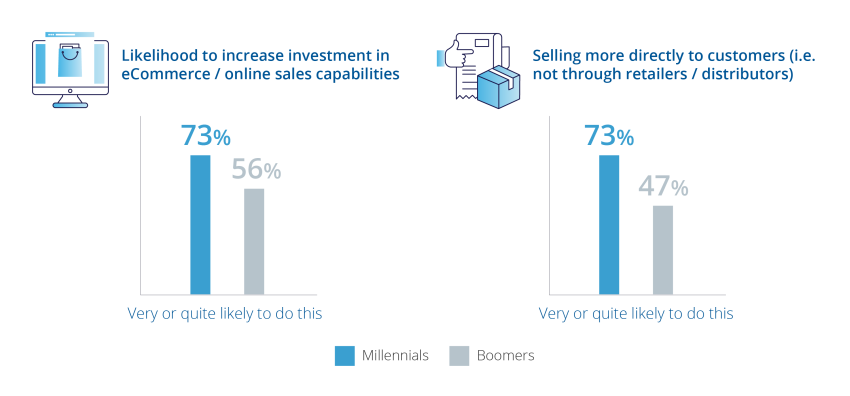
73% of millennial decision-makers are ‘very or quite likely’ to increase investment in eCommerce and online sales capabilities in their businesses, compared to 56% of boomers.
Equally, 73% of millennials are ‘very or quite likely’ to sell more directly to customers and not through retailers or distributors, compared to 47% of boomers.
Digital-ready B2B brands are more resilient and confident about their future prospects
We mentioned at the very start of this article that, whilst digital transformation was already on the minds of B2B business leaders, the events of 2020 forced the hand of many brands to start the digital transformation process earlier than expected.
Our research, on which the data in this article is based, took place during April and May at the height of the pandemic. So, we’ve been able to explore the contrasting attitudes and levels of business confidence of those who have and have not invested in digital during this period.
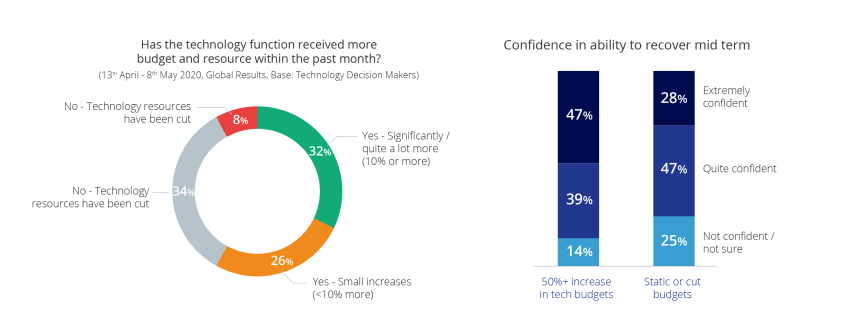
58% of B2B businesses said that their technology function received an increase in budget and resources within the past month. 32% saw a significant increase of 10% or more.
What we found was that businesses who saw an increase to their technology budgets had higher levels of business confidence.
In fact, among those businesses that saw a 50% or more increase to their budget, 47% were extremely confident in their ability to recover in the mid-term, compared to just 28% of businesses who either cut or kept their budget static.
3 steps B2B businesses can take to deliver world-class customer experience in the digital age
So, what can B2B businesses do to better meet the needs of today’s decision-makers and get the balance right between the digital experience and the human experience?
-
Set the right experience strategy and design the right experience
Determine exactly how the customer experience will deliver the brand promise and how the digital experience and human experience will interlink.
This requires a thorough understanding of different persona needs, and mapping their customer journeys from start to finish.
-
Work towards internal consistency
Developing internal consistency starts by removing organizational silos and integrating technology platforms to consolidate data from multiple sources and create a single view of the customer.
The next step is to invest in the right digital tools and consider establishing a digital center of excellence comprising specialists across different areas such as website, SEO, eComm, CX, marketing and sales.
-
Design and implement external consistency
To bring the brand to life and ensure the needs of customers are being met along the entire journey, ensure cutting-edge digital solutions are balanced with human experience. Every touchpoint, including digital, human and eComm, should be managed seamlessly to create a consistent experience whenever and wherever a customer engages with the brand.
Finally, it’s important to start quickly rather than wait for perfection, and measure and adapt as you go along using feedback from the market.
Summary
The importance of b2b digital transformation and the digital experience cannot be understated in today’s world. The new generation of millennial decision-makers demand highly relevant and personalized experiences across every touchpoint, both offline and online. Digital plays a crucial role in enabling brands to deliver a world-class customer experience, and the brands that get it right are more resilient and confident about the future.
And this b2b digital transformation journey has to start now. With 2/3 of B2B businesses now looking to invest in digital, the brands that fall behind at this stage risk never catching up. The future is now and brands need to fully embrace digital if they are to win in this rapidly changing world.
If you are seeking more in depth insights into the digital future for B2B organizations, download the recording of our recent webinar with B2B International and Isobar where we explored some exclusive research findings and provided suggestions as to how you can create that ideal customer experience.
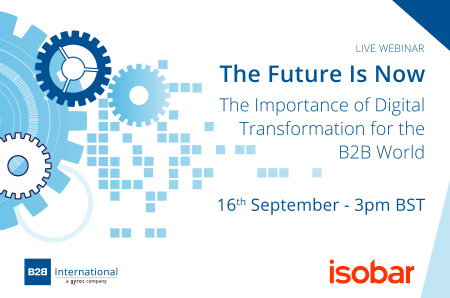
Readers of this article also viewed:


